Division for Studies in Social Inclusion
The Division undertakes policy-oriented multidisciplinary research on a broad range of sectors and priority themes. The domain of inclusive studies – viewed from a variety of perspectives such as inequalities, social exclusion, inclusive growth and development and marginalisation–has emerged as a marquee development discourse across the globe. In the Indian context in particular, the significance and relevance of social inclusion cannot be overemphasised, particularly in the light of the fact that the stated objective of development interventions is to make social, economic and political systems more inclusive. Additionally, the overarching theme of inclusiveness assumes added significance as it figures prominently on the policy and political agendas at different levels – with inclusive and sustainable development emerging as the Global Goals under the Sustainable Development Goals (SDGs) for the planet.
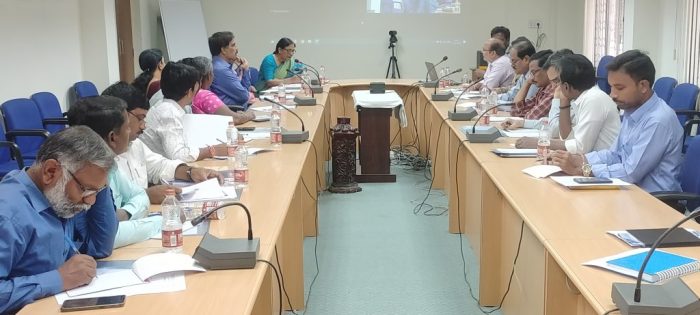
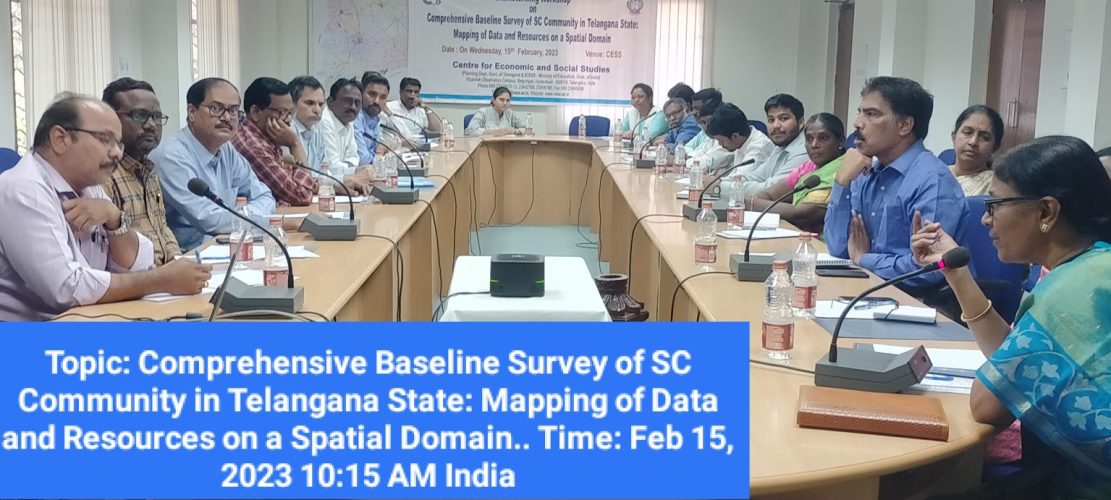
The origins of DSSI trace to the establishment of two research units at CESS in 2016with the support from the Government of Telangana, that is, the Scheduled Castes Special Development Fund Research Unit (SCSDFRU) and the Scheduled Tribes Special Development Fund Research Unit (STSDFRU). The core mandate of the Units was to study the gaps in development and well-being of the SCs and STs vis-à-vis other social groups and to recommend policy priorities on the basis of gap analyses so that course corrections can be effected on the basis of empirical evidence.
Over the years, the ambit of research at the Division has steadily expanded with a growing number of sponsoring agencies acknowledging the policy relevance of work carried out at the Division. In addition to the long-standing focus on the historically disadvantaged social groups – especially in building up empirical evidence on theirconstraints and barriers so as to enable policy makers, practitioners and other stakeholders to achieve inclusive development – the scope of research at the DSSI also encompasses other excluded and underrepresented groups such as Backward Classes (BCs), women and religious minorities. In terms of specific themes the research scope of the Division has broadened to encompass areas such as migration, livelihoods (including skill/capacity development), entrepreneurship promotion and empowerment through science and technology interventions.
It goes without saying that the research carried out at the Division broadly lies at the intersection of several Social Science disciplines striking a right balance between quantitative and qualitative methods. The research mandate of the Division encompasses the following:
- To undertake studies on the development priorities of the marginalised groups such as the SCs, STs, BCs, women and minorities in order to ensure that they are targeted more inclusively with commensuratefinancial commitments on the basis of the identified disparities.
- Tocarry out multidisciplinary and collaborative research (analytical and theoretical) on the long-term development concerns of the marginalized and underrepresented groups.
- To conduct evaluations of the ongoing interventions in order to enable policy makers to initiate course corrections.
- To conduct state level and national seminars, workshops and thematic lectures to disseminate our findings and lean from the experience and work of other stakeholders.
- To bring out a range of publications – such as policy briefs, working papers, monographs, books and reports – in order to inform policy and advance research in the priority areas.
Research Team - Division for Studies in Social Inclusion
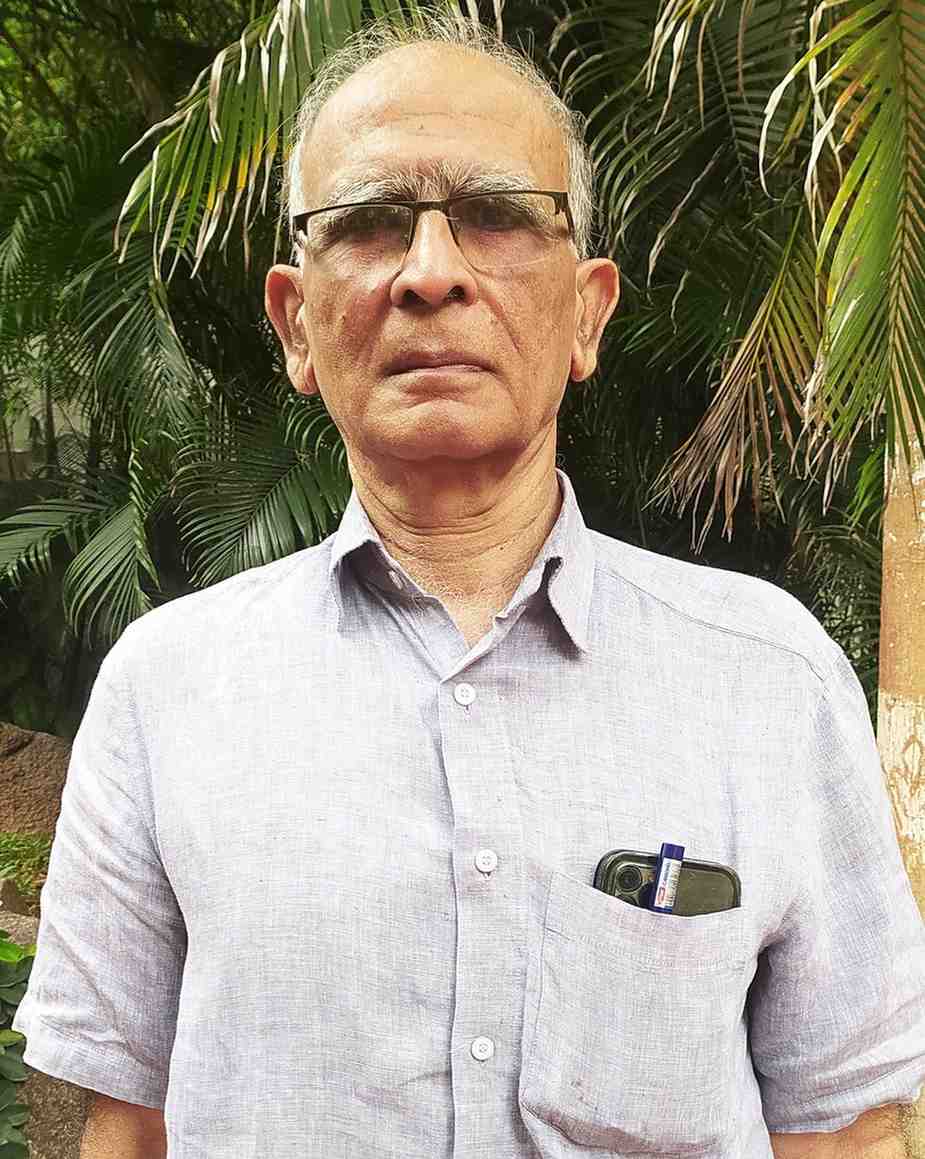
C H Balramulu
Visiting Professor

Laxman Rao Sankineni
Associate Professor and Coordinator

Sudhaveni Naresh
Assistant Professor
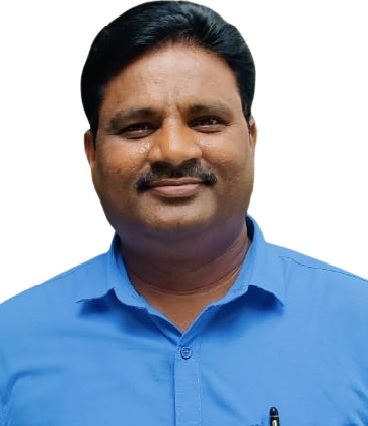
Silveru Harinath
Research Associate

Parupally Anjaneyulu
Research Associate

Keshabhakthula Bhaskar
Research Associate
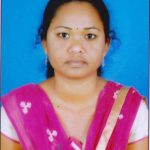
Thati Aswani
Research Assistant
Research Team
| Dr Ch. Balaramulu | Adjunct Professor |
| Dr Laxman Rao Sankineni | Associate Professor and Coordinator |
| Dr Sudhaveni Naresh | Assistant Professor |
| Dr Silveru Harinath | Research Associate |
| Dr Parupally Anjaneyulu | Research Associate |
| Dr. Keshabhakthula Bhaskar | Research Associate |
| Ms Thati Aswani | Research Assistant |
| Mr Pannala Yadaiah | Office Attendant |
Ongoing Studies
- Comprehensive Baseline Survey of SC Community in Telangana : Mapping of Data and Resources on a Spatial Domain, commissioned by TSCOST (Telangana Council for Science and Technology). The survey will collect data from 10,000 SC households representing both rural and urban segments of all 33 districts of the State.
- Budget Analysis of the SCSDF (Scheduled Castes Special Development Fund) of Telangana Government. Preparation of the latest iteration of the annual series is underway.
- Telangana Scheduled Castes Development Report; this is a relatively long-term project of the Division which comprehensively documents the socio-economic status of the community in the State on the basis of secondary data and micro studies.
- Study on Enrolment, Performance and Placement Status of the Scheduled Caste Students of Professional Colleges in Telangana. Commissioned by the Scheduled Castes Development Department of Government of Telangana. The study has collected student data from the sample professional colleges of the State.
- Opportunities and Challenges of Gulf Labour Migration: A Household Study in Telangana – a primary data-based study supported by the ICSSR(Indian Council of Social Science Research).
- DSSI researchers are part of an innovative research project undertaken by CESS titled River Cities in Asia commissioned by International Institute of Asian Studies (IIAS), Netherlands.
Research Studies and Assignments Completed
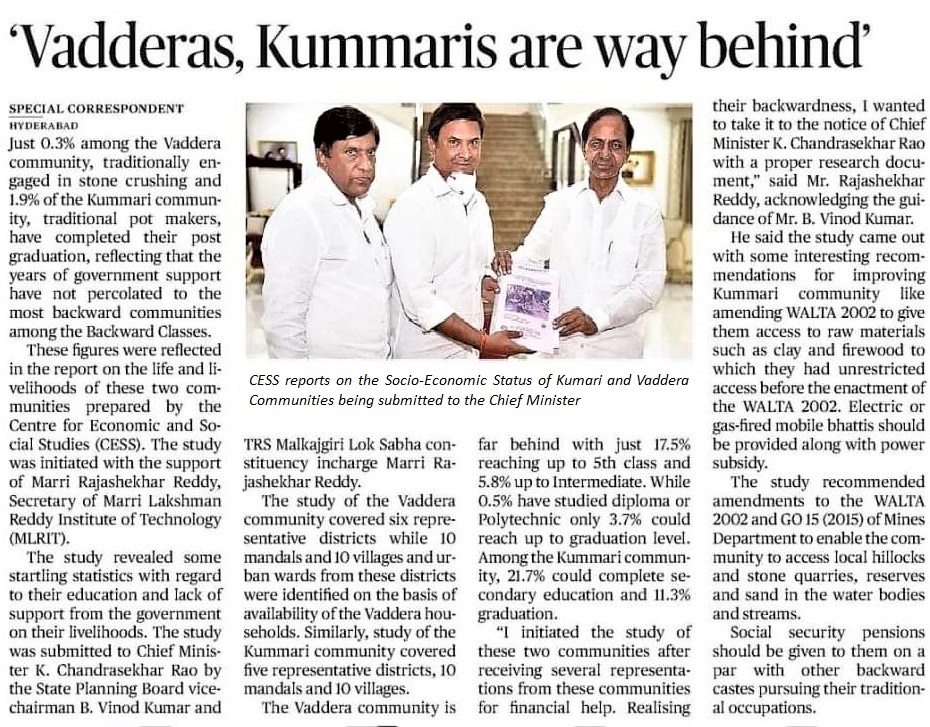
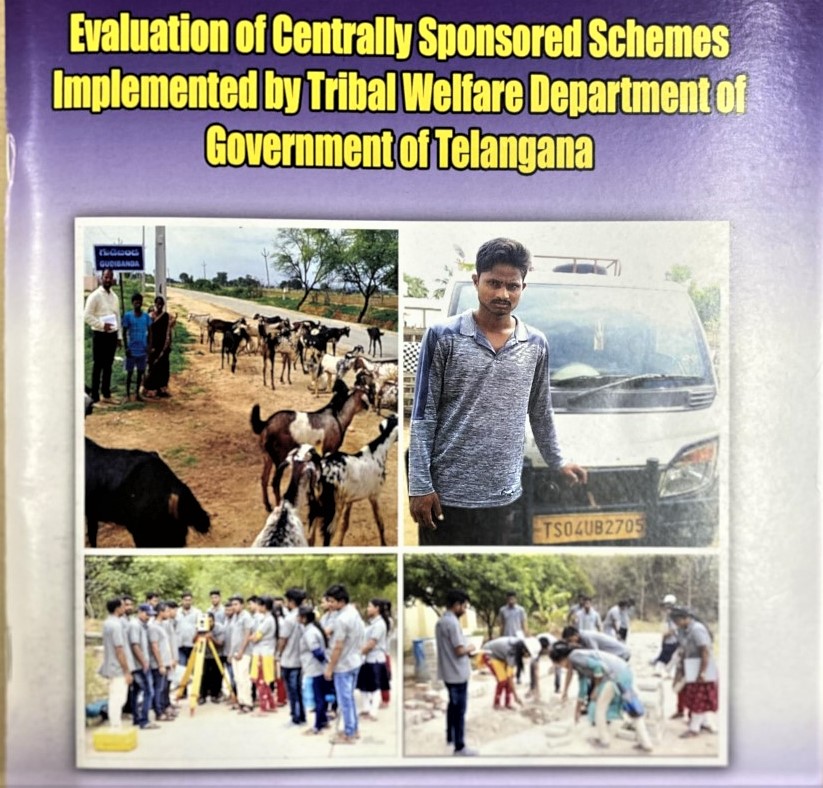
- Performance of Scheduled Tribe Students in Scheduled Areas: A Comparative Study of Schools under Different Managements, 2018.
- Socio-Economic Status of Particularly Vulnerable Tribal Groups (PVTGs) in Telangana,2018.
- Concept Paper on Well-being, 2016.
- A Preliminary Status Report of Scheduled Tribes: State-Level Well-being and Gaps across Social Groups, Part I, 2016.
- A Status Report of Scheduled Tribes: District-Level Well-being and Gaps across Social Groups, Part II, 2016.
- Telangana Scheduled Castes’Human Development Report–Baseline, 2017.
- Prevalence of Jogini System and Rehabilitation of Jogini Women in Telangana: Issues and Challenges, 2019.
- Role of Dr B.R. Ambedkar Bhavans and Community Halls in the Empowerment of Scheduled Castes in Telangana: Issues and Challenges,2019.
- Implementation of Integrated Scheme of Book Banks for SC Students in Telangana: Issues and Challenges, 2019.
- Evaluation of Micro, Small and Medium Enterprises: With Special Referenceto the Entrepreneurs of Scheduled Castes: Issues and Challenges, 2019.
- Implementation of Best Available Schools Scheme for Scheduled Caste Students: Issues and Challenges, 2019.
- Study on Management of Social Welfare Hostels in Telangana: Issues and Challenges, 2019.
- Integrated Child Development Services to SCs in Telangana : Implementation of Services at Anganwadi Level, 2019.
- Performance of Scheduled Caste Students vis-à-vis others in Schools under Different Managements, 2018.
- Assessment of Socio-Economic Conditions of Backward Castes in Telangana (report submitted to the Telangana Backward Classes Commission), 2019.
- Evaluation of Centrally Sponsored Schemes Implemented by Tribal Welfare Department of Government of Telangana (2021).
- Evaluation of Scheduled Tribes Special Development Fund of Telangana (2021).
- Socio-Economic Status of the Kummari Community in Telangana : Findings of an Empirical Study (2022).
- Socio-Economic Status of the Vaddera Community in Telangana : Findings of an Empirical Study (2022).
- Impact Evaluation of Ambedkar Overseas Vidhya Nidhi (AOVN) Scheme of Telangana Government (2022).
- Analysis of the Scheduled Castes Special Development Fund (SCSDF) of Telangana Government (four reports have been prepared in the annual series)
- Impact of Covid-19 on School Education with Special Focus on Scheduled Caste Students: Findings of a Rapid Phone Survey.
- Addressing Labour Migration and Preparation of Development Plan for Adoni Division of Kurnool District of Andhra Pradesh (2022).
- “Glimpses of Accomplishments”,a compendium of achievements under the Scheduled Castes Development Department (GoT) through its 26 welfare schemes and interventions since the formation of Telangana.
- “Analysis of SKS Data for Scheduled Castes Related to Agriculture”, submitted to the Scheduled Castes Development Department (GoT).
Working Papers, Monographs and Special Reports
- Tribal Development in Telangana: Issues and Challenges (report on brainstorming session).
- Scheduled Castes’ Development in Telangana: Issues and Challenges (report on brainstorming session).
- Socio-Economic Status of the PVTGs (Particularly Vulnerable Tribal Groups) in Telangana.
- Perceptions of Students, Teachers and Principals of Schools under Different Managements: A Study in Warangal District of Telangana (CESS Monograph).
- Socio-Economic Status of the Kummari Community in Telangana: Findings of an Empirical Study (CESS Monograph 51).
- Socio-Economic Status of the Vaddera Community in Telangana: Findings of an Empirical Study (CESS Monograph 52).
- Prevalence of Jogini System and Rehabilitation of Jogini Women in Telangana: Issues and Challenges (CESS Monograph – forthcoming).
- Integrated Child Development Services to SCs in Telangana: Implementation of Services at Anganwadi Level (CESS Monograph- forthcoming).
- Role of Dr B.R. Ambedkar Bhavans and Community Halls in the Empowerment of Scheduled Castes in Telangana: Issues and Challenges (CESS Monograph – forthcoming).
- Impact Evaluation of Ambedkar Overseas Vidhya Nidhi (AOVN) Scheme of Telangana Government (CESS Working Paper – forthcoming).
Policy Briefs
- Management of Social Welfare Hostels in Telangana: Insights, Opportunities and Challenges, by S. Naresh
- Integrated Child Development Services to Scheduled Castes in Telangana: An Assessment of Services at Anganwadi Centres, by P. Anjaneyulu
- Prevalence of Jogini system and Rehabilitation of Joginis in Telangana: Issues and Challenges, by K. Bhaskar.
- Best Available Schools Scheme for the SC Students in Telangana, by S. Naresh and M. Lakshman.
- Implementation of Integrated Scheme of Book Banks for SC Students in Telangana: Issues and Challenges, by S. Madhukar and Balsingh Mood
- Empowering Scheduled Castes through Community Halls in Telangana: Opportunities and Challenges, by S. Harinath
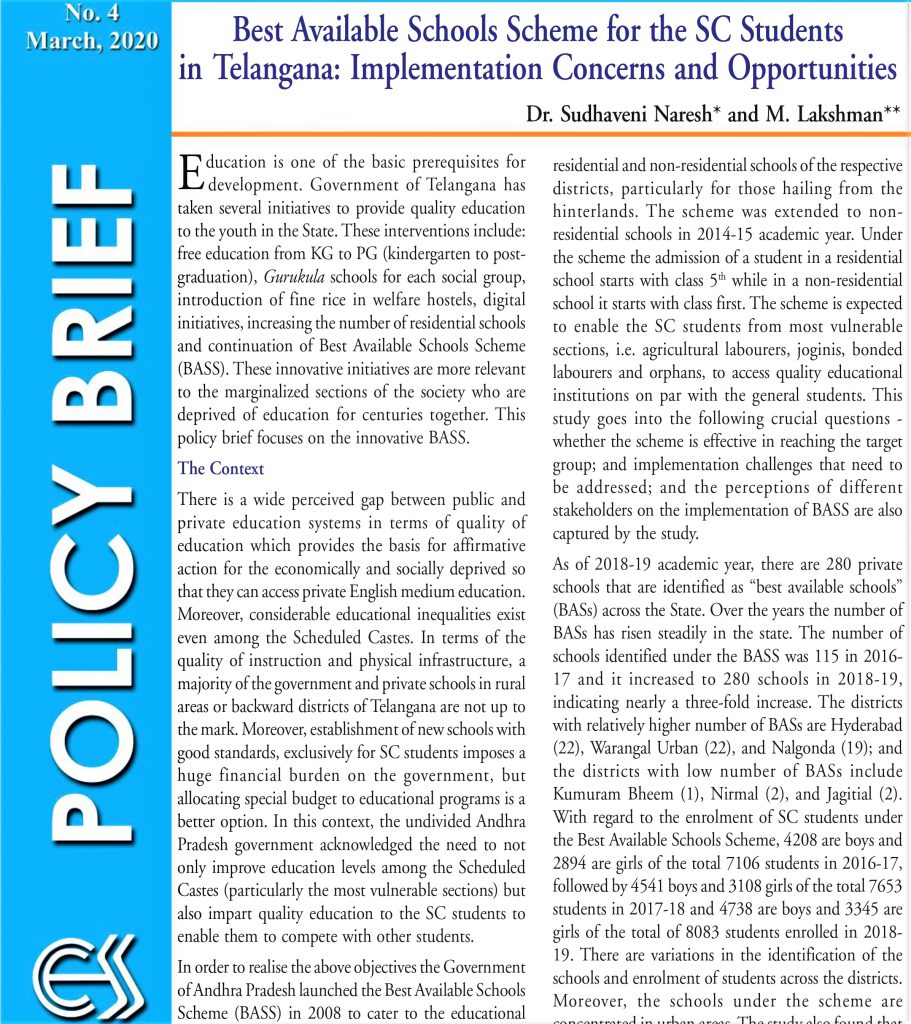
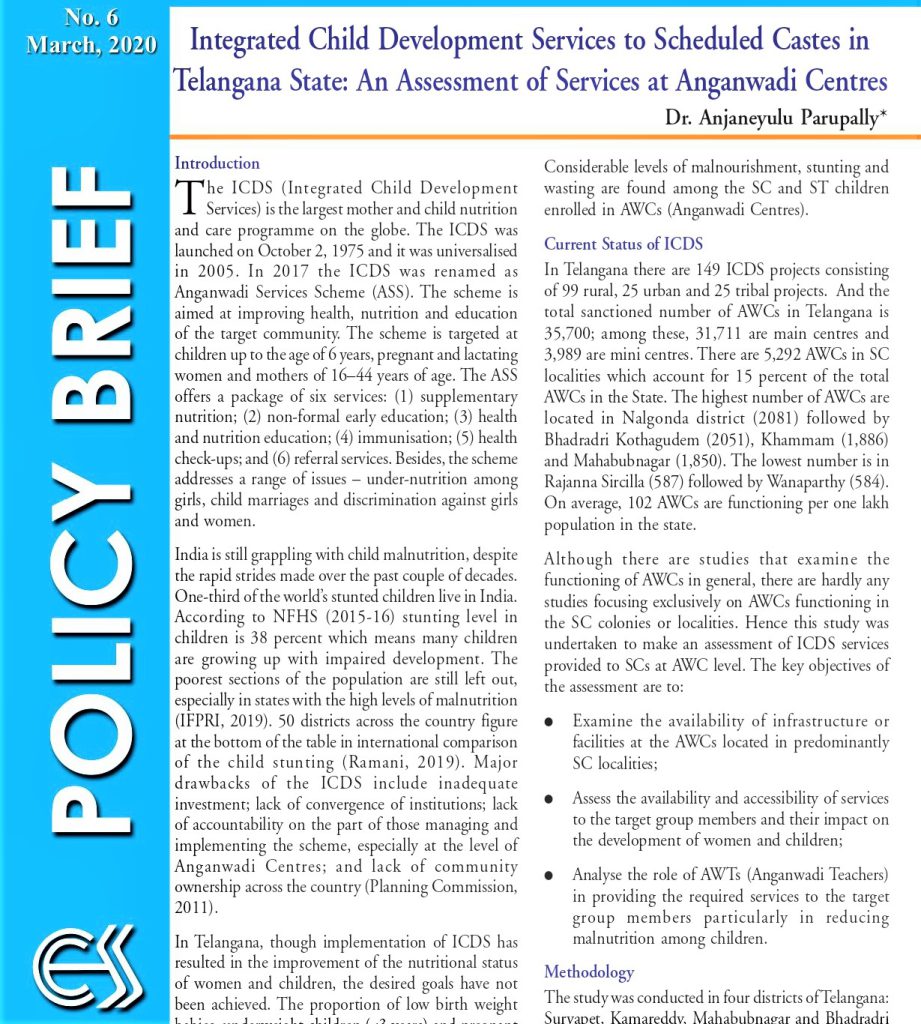
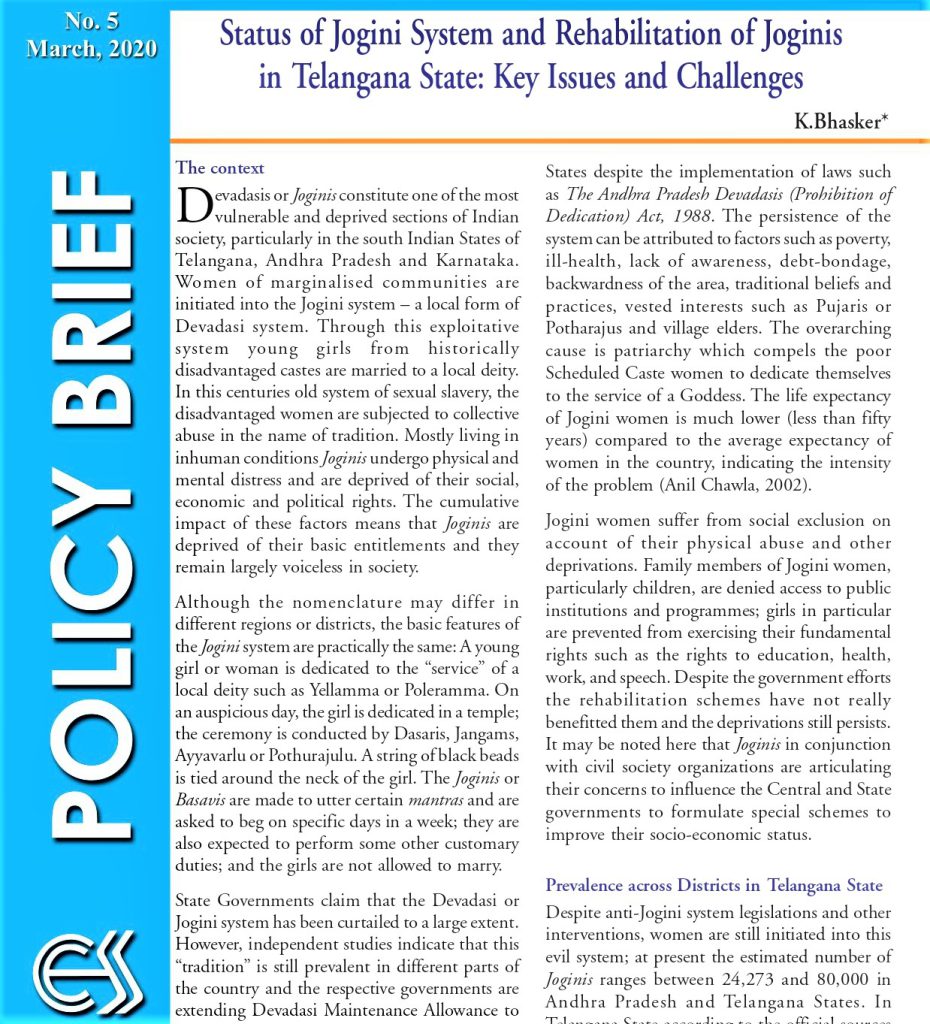
Recent Publications by DSSI Team
- Laxman Rao, S with Harinath, S (2023) (forthcoming): “The Future of Pottery: Insights Emerging from Empirical Evidence from Telangana”, South Asia Research (a Sage international journal).
- Laxman Rao, S et al (2022): Evaluation of Centrally Sponsored Schemes Implemented by Tribal Welfare Department of Telangana Government, published by Tribal Cultural Research & Training Institute (TCR&TI), Government of Telangana.
- Laxman Rao, S with Harinath, S (2022): Socio-Economic Status of the Kummari Community in Telangana : Findings of An Empirical Study, Monograph 51, Centre for Economic & Social Studies.
- Laxman Rao, S with Anjaneyulu, P (2022): Socio-Economic Status of the Vaddera Community in Telangana : Findings of An Empirical Study, Monograph 52, Centre for Economic & Social Studies.
- Naresh Sudhaveni with Revathi, E and Kamble, P (2020): “Mapping of Performance of Scheduled Caste Students under Different Learning Environments in Telangana”, Journal of Indian Association of Social Science Institutions, 39(2): 210-232, ISSN:0970-9061.
- Naresh Sudhaveni (2019): “Russia-India Economic Relations: Future Prospects”, Diplomacy and Beyond Plus(Journal of Foreign Policy and National Affairs),6(3), 16-18, ISSN: 2581-8929.
- Naresh Sudhaveni (2018): “Migration Patterns in the Contemporary Russian Federation (1991-2013)”, International Journal of Research in Social Sciences, 7(9): 772-795, ISSN: 2249-2496.
- Naresh Sudhaveni (2018):“Fertility Preferences in India”,inStuart Gietel-Basten (ed), Family Demography in Asia: A Comparative Analysis of Fertility Preferences, Edward Elgar publishing, UK. ISBN: 978-1-78536-355-9.
- Naresh Sudhaveni (2019): “Performance of Scheduled Caste Students vis-a-vis Others under Different Managements in Telangana”,conference volume of the Third Annual Conference of Telangana Economic Association (TEA), Department of Economics, Osmania University, Hyderabad, ISBN: 978-81-940369-0-6.
- Anjaneyulu, P (2023): “Role of Pre-School Teachers in Early Childhood Care and Education: A Study of Anganwadis Located in Scheduled Caste Colonies of Telangana ”,Contemporary Voice of Dalit (SAGE Publication – forthcoming).
- Anjaneyulu, P (2021): “Impact Assessment of Schemes Introduced for Drought-Prone Districts of Telangana”, The International Journal of Analytical and Experimental Modal Analysis, ISSN No- 0886- 9367.
- Anjaneyulu, P (2021)” Contributed three chaptersfor book on Regional Geography of Telangana”, General Competitive Purposes, Telugu Academy, Government of Telangana. ISBN No- 818180461-9.
- Anjaneyulu, P (2021): Contributed three chaptersfor book on Human and Economic Geography, Intermediate Second Year, Telugu Academy, Government of Telangana.ISBN No- 818180461-9.
- Anjaneyulu, P (2018): “Analysis of Sanitation and Health in South Asian Countries: With Special Reference to India”,IASSI Quarterly: Contributions to Indian Social Science, Vol. 37, No. 2.
- Bhaskar, K (2021): “Socio-Economic Conditions and Rehabilitation of Joginis in Telangana ”, Man and Development, Vol. 41, No 3.
- Bhaskar, K (2020): “Public Health Care System in Telangana: A Study of Aarogyasri Health Scheme”, in Shodh Sanchar Bulletin, Vol. 10, Issue 38(V) April-June.
- Bhaskar, Kwith Naresh S, Kamble P, and Harinath S(2019): “Performance of Scheduled Caste Students vis-à-vis Others under Different Managements in Telangana”, in Telangana Economic Association Third Annual Conference Papers, ISBN- 978-81-940369-0-6Department of Economics, Osmania University.
- Bhaskar, K (2019): “Drought Relief Programmes in a Telangana Village: A Case of Rural Mahabubnagar District”, inedited book Social Policies for Development: Emerging Trends and Concepts’, New Delhi.
- Harinath S (2022): “Dr. B. R. Ambedkar Bhavans/Community Halls in Telangana: An Evaluation Study”, inContemporary Voice of Dalit, (Sage Publications). https://doi.org/10.1177/2455328X221139093.
- Harinath S andNagaraju G(2021):“Dalits and Choice of School: A Sociological Study of Private Schools in Telangana”, in Sociological Bulletin, 70(2), 214-231, (Sage Publications) https://doi.org/10.1177/0038022921993969.
- Harinath S (2020):“Experiencing Dalit Children in Schools: A Sociological Study inTelangana”, Madhya Pradesh Journal of Social Sciences, Volume 25, Issue 1, pp. 38-58.ISSN: 0973-855X.
- HarinathS (2020): “Functioning of SelfHelp Groups and its Impact on Empowerment of Scheduled Caste Women: Perspectives from Rural Telangana”, Governance of Public Policy, (10), 58-70.
- Harinath Swith Laxman Rao S (2023): “The Future of Pottery: Insights Emerging from Empirical Evidence from Telangana”, South Asia Research (Sage Publications (forthcoming).
Informing Policy for Social Impact
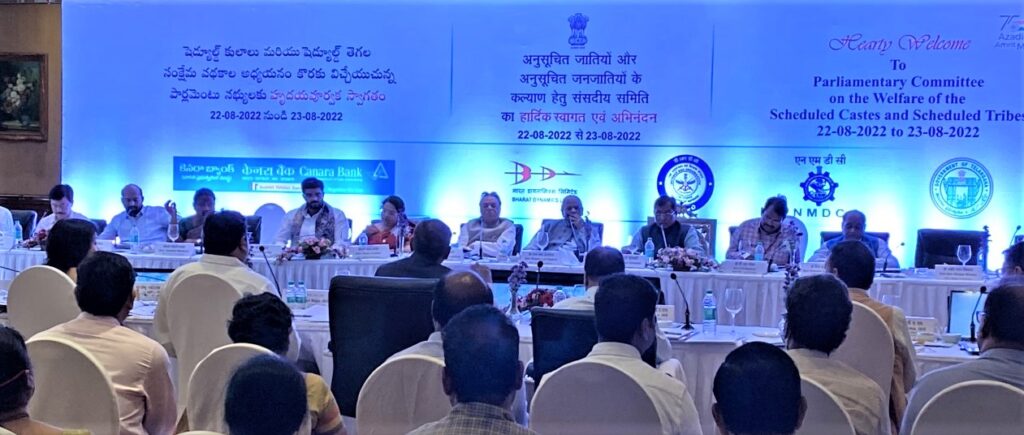
Research conducted at the Division is policy oriented. Evidence-based inputs by way of policy recommendations are presented to the policy makers in order to ensure that the research output is socially relevant and impactful. Some illustrative cases are presented here in this regard.
The Scheduled Castes Development Department (SCDD) of the Government of Telangana had accepted the key recommendations of the Division emerging from an evaluation of the Best Available Schools scheme. As a quick follow-up the SCDD constituted a committee on the scheme—which included two researchers from the Division (Dr Laxman Rao and Dr Naresh)—to take forward the implementation of the recommendations by collecting fresh data from government agencies and empanelled schools.
Adoni area—the western part of Kurnool district in Andhra Pradesh—has remained underdeveloped, characterised by relative remoteness, low levels of human development and large scale out-migration. The chronically drought-prone area consists of as many as 17 mandals with a population of 14.7 lakhs. At the behest of Hon’ble Chief Minister, the Government of Andhra Pradesh commissioned a special research team to study the mass migration from Adoni area and prepare a development plan for its accelerated development. The research team was composed of Dr. Laxman Rao, Dr Harinath, Dr Anjaneyulu and Dr Naresh. Acting on the evidence-based development plan prepared by the team, the State Government has initiated a broad range of development interventions whose implementation will be monitored by the newly established Adoni Area Development Authority (AADA).
As part of the mandatory process of sub-national localisation of the 16 Sustainable Development Goals(SDGs), researchers from the DSSI, in conjunction with other faculty members of CESS, have mapped the baseline status of Telangana with respect to the 16SDGs. The performance of States towards achieving the SDGs is monitored by NITI Aayog on an annual basis through indices and rankings.
The DSSI team prepared a detailed power point presentation on the socio-economicstatus of the Scheduled Castes in Telangana which was presented at a consultation with the Parliamentary Committee on the Welfare of the Scheduled Castes and Scheduled Tribes. The Committee visited Telangana in August 2022. Members of the Committee evinced keen interest in and made a special note of innovative schemes implemented by Telangana Government for the development of the SCs in the State, such as Dalit Bandhu, Ambedkar Overseas Vidya Nidhi (AOVN) and Kalyana Lakshmi (Shaadi Mubarak).
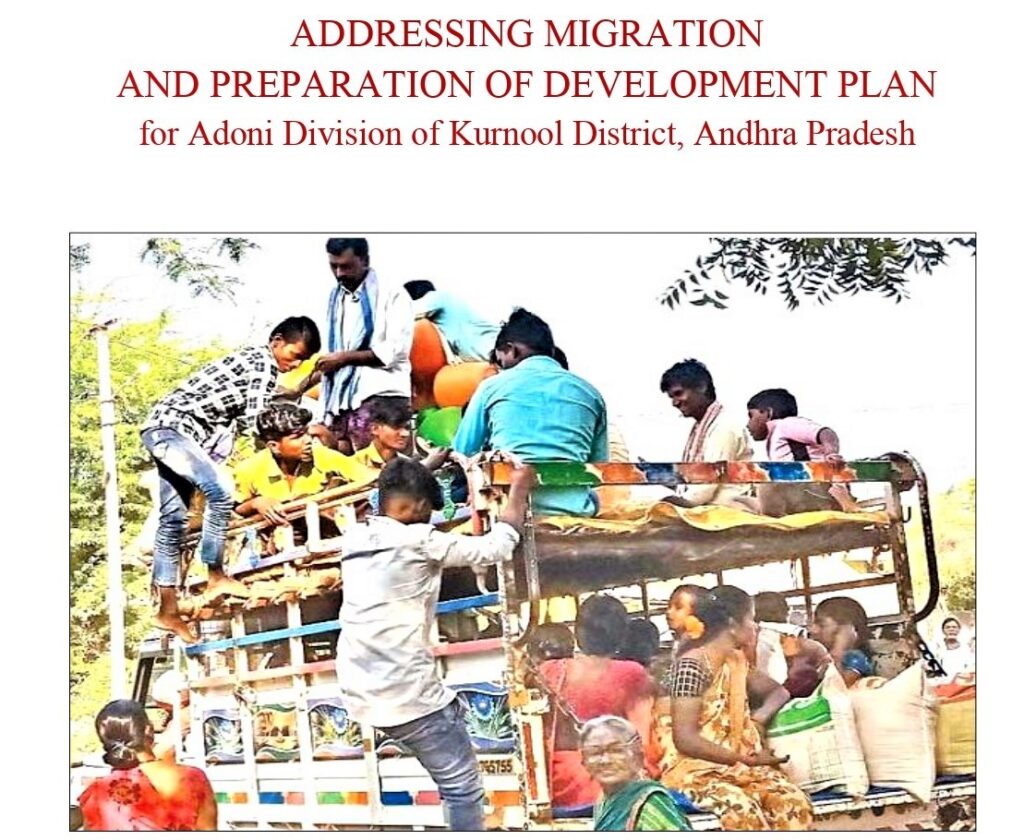
Recent Presentations and Lectures by DSSI Team
By Laxman Rao Sankineni
Presentation, with Harinath S,on:The Future of Pottery: Insights Emerging from Empirical Evidence from Telangana, at63rd Annual Conference of the Indian Society of Labour Economics (ISLE), 1-3March, 2023, Itanagar, Arunachal Pradesh.
Featured presentation on:Sustainable Development Goals and Good Governance at National Institute of Rural Development and Panchayati Raj (NIRDPR), Hyderabad, 5April 2022.
Presentation on: Socio-Economic Status of Scheduled Castes in Telangana: before the Committee of Legislators on Dalit Empowerment constituted by Government of Telangana, December 2021.
Presentation on: Empowerment of Dalits inTelangana: Emerging Prioritiesat a seminar on “Policy Imperatives of Dalit Empowerment in Telangana: Evidence, Key Issues and Priorities”, Centre for Economic & Social Studies, August, 2021.
Presentation on: Baseline status of Telangana on two Sustainable Development Goals (SDGs): SDG 10 (Reduced Inequalities) and SDG 16 (Peace, Justice & Strong Institutions), Planning Department (GoT) and Centre for Economic & Social Studies, January, 2021.
By Naresh Sudhaveni
“India’s Strategic Importance in Indian Ocean Region: Changing Balance of Power”, at international e-conference on India and Post Covid-19 International Relations: Prospects and Challenges, December 14-15, 2022.
“Understanding Migration Governance: Evidence of Growing Insecurities Due to COVID-19 in India”, at 4thinternational e-conference on Migration, Governance, and COVID-19: Perspectives, Policies, Opportunities and Challenges, 3-4 November 2022,
“Costs and Benefits of Gulf Migration from Telangana”,at a national symposium, organized by Centre of Excellence for Public Policy Research, Woxsen University, Hyderabad, September 2022.
“Impact of Covid-19 Pandemic on Gulf Migration: A Study of Telangana, India”,at the “Migration Conference 2022”, September7–10, organized by Mohammed V University of Rabat, Morocco.
“Impact of the Covid-19 Pandemic on Internal Migrant Workers in India”, at international e-conference on “Microeconomic Impacts of COVID-19 Pandemic”, October 2-3, 2021organized by CAPCDR, New Delhi.
“India’s Strategic Significance and Security Challenges in Indo-Pacific Region”, at online international conference on “Indo-Pacific Construct: A New Regional Order and Implications”, 21-23 June 2021, organised by UGC Centre for Southeast Asian and Pacific Studies and partners.
“Covid-19 Impact on School Education: A Study of Telangana, India” at international conference on “Post Covid Challenges and Rural Development in South Asia”, 17-18 March, 2021 organised by the School of Humanities and Social Sciences, Assam Down Town University.
By Anjaneyulu Parupally
“Precariousness of Natural Resource-Based Livelihoods: A Study of the Vaddera Community of Telangana”, at 44th Indian Geography Congress, at Rani Channamma University, Belagavi, Karnataka,December 19 to 21, 2022.
“Impact of Regional Ring Road (RRR) on the Main Locations and Towns: A Case of Resources and Opportunities”,at the 21st Association of Punjab Geographers (APG) Meet and International E-Conference at Kurukshetra University, Haryana, December 30-31, 2021.
“Impact of Covid-19 on Teachers of Private Educational Institutions in Telangana”atIGS – International E- Conference, Osmania University, August 5-7, 2021.
By Harinath Silveru
Delivered a lecture on “Development of Scheduled Castes in Telangana: Issues and Challenges”,at a state-level conference, organized by Action Aid, Hyderabad, 31March 2022.
Delivered a lecture on “SC Sub-Plan Implementation in Telangana”,at Sundaraiah Vignana Kendram, organized by National Campaign on Dalit Human Rights (NCDHR), 12 May 2022.
“Impact of Covid-19 on School Closures: With Special Reference to Public Schools In Telangana”, at 46th All India Sociological Conference, Organised by University of Mumbai, December 8-10, 2021.
Delivered a lecture on Unemployment in India: Issues and Challenges, at a State Conference, Organized by Bahujana Vidhyavanthula Vedika (BVV), July 25th 2021, Sundarayya Vignana Kendram, Hyderabad.
By Bhaskar Keshabhakthula
“Drought Relief Programmes in a Telangana Village: A Case of Rural Mahabubnagar District”,atTelangana Economic Association(TEA) Third Annual Conference, 9-10, February 2021.
“Performance of Scheduled Caste Students vis-à-vis Others under Different Management Schools in Telangana”,at Third Annual Conference of Telangana Economic Association, Osmania University, Hyderabad, 9-10, February 2021 (Jointly with Naresh S, Kamble P, and Harinath S).
Events Hosted
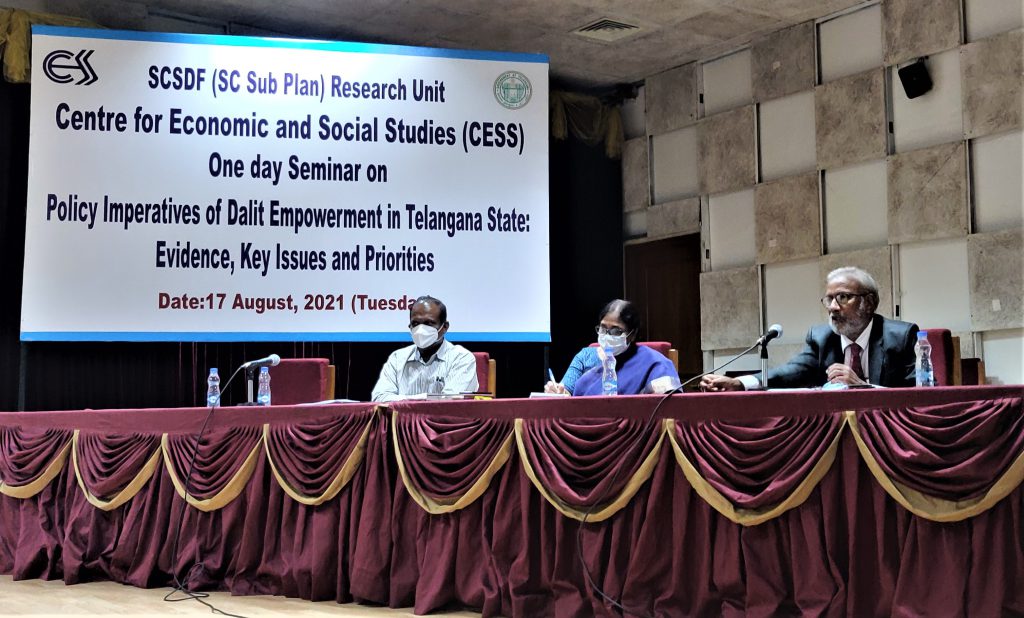
- Multistakeholder brainstorming session on identifying key issues for STI (Science, Technology & Innovation) interventions for the research project on: Comprehensive Baseline Survey of SC Community in Telangana: Mapping of Data and Resources on a Spatial Domain, 15 February, 2023.
- Consultative meeting of specially constituted Research Advisory Committee (RAC) to identify the areas for livelihoods-enhancing technologies under the research project: Comprehensive Baseline Survey of SC Community in Telangana: Mapping of Data and Resources on a Spatial Domain, 17February, 2023.
- One-day seminar on:Policy Imperatives of Dalit Empowerment in Telangana: Evidence, Key Issues and Priorities, 9August 2021.
- Multistakeholder brainstorming session to map the issues and challenges related to the traditional occupation of the Kummari community in Telangana to design an empirical study on their socio-economic status,August 2020.
- Multistakeholder brainstorming session to map the issues and challenges related to the traditional occupation of the Vadderacommunity in Telangana to design an empirical study on their socio-economic status,August 2020.
- Multistakeholder brainstorming event to map issues and challenges of Scheduled Castes’ development in Telangana to shortlist priority themes for further research to be undertaken by the Division, November 2017.
- Multistakeholder brainstorming event to map issues and challenges of Scheduled Tribes’ development in Telangana to shortlist priority themes for further research to be undertaken by the Division, June 2017.
